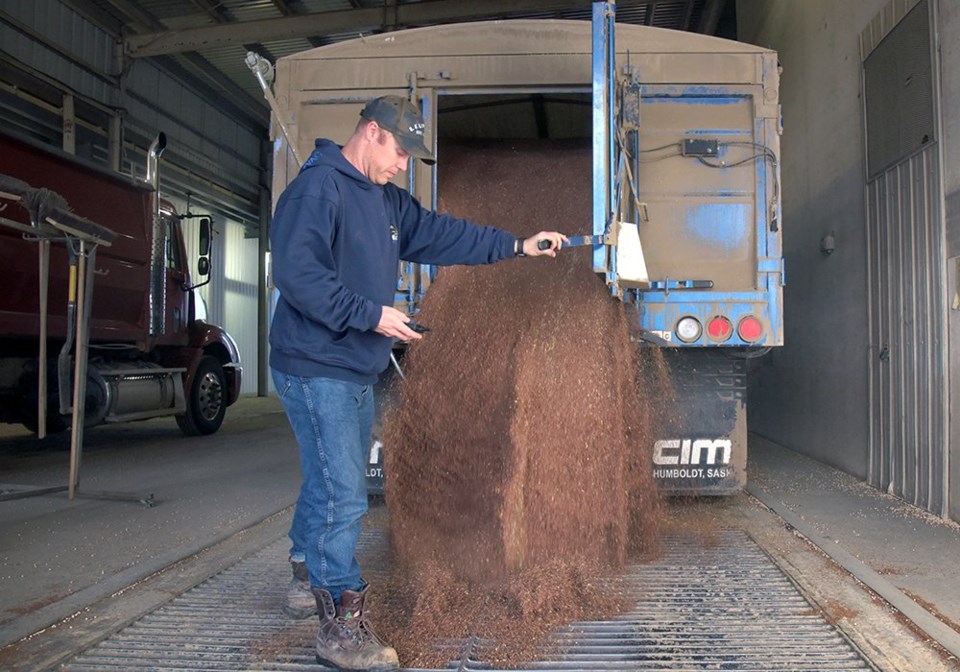WESTERN PRODUCER — The Canadian Grain Commission is reminding grain growers of steps that can be taken to reduce the risk of not being paid for the grain they deliver.
“With grain deliveries in full swing, the Canadian Grain Commission wants to help producers reduce their risk of non-payment,” the CGC said in a recent email to The Western Producer.
“Producers can reduce their risk by carefully reviewing their delivery contracts, getting the right documents, depositing cheques right away, and contacting the Canadian Grain Commission as soon as possible if they’re having trouble getting paid.”
The CGC has programs in place to ensure that farmers get paid for what they deliver.
Under the Safeguards for Grain Farmers Program, licensed grain companies must provide security to the grain commission.
That security is used to compensate producers for grain deliveries if the company is insolvent or unable to pay its debts. But the CGC program does not provide an iron-clad guarantee for producers.
The onus is still on grain growers to ensure that they are eligible for compensation and that proper steps have been taken to secure necessary documents within prescribed timeframes.
Details of payment protection programs for producers can be viewed on the CGC’s website at grainscanada.gc.ca. Click on the Producer Protection tab and select the Payment Protection tab in the drop-down menu.
“What’s fundamental to what we want producers to know is that they should get paid as soon as possible,” said CGC spokesperson Remi Gosselin.
“When (producers) don’t secure payment immediately or within a few days of delivery, they’re lending their money to the grain company and they need to take every step to make sure they get paid properly.”
One of the most important steps that producers can take to protect themselves against non-payment risk is to ensure they are delivering their grain to a licensed grain company and to request documentation for every load of grain that’s delivered.
Every time a load of grain is dumped at the elevator, producers should get a document from the grain buyer showing the type of grain delivered, the grade, the weight and the date of delivery.
Specifically, one of the following documents should be issued to the grower:
- a cash purchase ticket or grain cheque that’s issued in exchange for grain that’s been sold and delivered;
- a primary elevator receipt that’s issued for grain that’s delivered and kept in storage but not yet sold;
- a grain receipt that’s issued when the grain is delivered and ownership of the grain is transferred from the producer to the grain buyer.
Scale tickets are not accepted in support of producer claims under the CGC’s Safeguards for Grain Farmers program.
In all cases, grain cheques that have been issued should be deposited immediately and any difficulties associated with converting the cheques to cash should be reported to the commission immediately.
To be eligible for compensation through the CGC’s Safeguards for Grain Farmers program, grain farmers must contact the CGC within 30 days of the date that a bank, credit union or financial institution refuses to convert a grain company’s cash purchase ticket or grain cheque into cash.
In addition, to ensure protection under the CGC program, all grain receipts and primary elevator receipts must be exchanged for a cash purchase ticket or cheque within 90 days from the date the grain was delivered.
According to the CGC website, producers are eligible for compensation under the safeguards program within 30 days of the date that a grain purchase ticket or cheque was issued, or within 90 days from the date the grain was delivered.
It is important to note that the lesser of these two time periods will be used to determine eligibility.
Growers are advised to quickly convert their grain receipts and primary elevator receipts. Cheques should be received and cashed within 90 days of grain delivery.
Failure to pay for grain that’s been received often involves situations where the grain company or grain buyer refuses to issue a cheque, a grain receipt or a primary elevator receipt.
Another sign of potential non-payment risk is if the company receiving the grain asks the grower to postpone cashing a cheque that’s been issued.
Producers should be wary of post-dated cheques.
If a licensed company gives a producer a post-dated cheque, the producer is eligible for compensation for 30 days from the date the post-dated cheque was given or mailed to the producer, regardless of the date on the cheque.
“Deferring payment is a popular financial planning tool but can leave producers at risk of major financial loss,” the CGC said.
“Depositing … payment as soon as possible is important to mitigate non-payment risk.”
Producers should also be mindful of conditions that might apply when grain is sold under contract.
For example, they are only eligible for compensation through the CGC’s safeguards program for 90 days from the date of grain delivery, even if fulfilling their contract requires multiple deliveries over an extended period of time.
Producers who sign the waiver on their combined primary elevator receipt no longer have the right to receive the same grain in exchange for their primary elevator receipt in the case of a licensee failure.
Gosselin said it’s important that producers are aware of their rights and responsibilities, particularly when large volumes are being contracted and multiple deliveries are required.
“I think that the environment has gotten a lot more complex in terms of how grain is contracted,” Gosselin said.
“Producers may provide multiple deliveries and may not seek payment until all of their deliveries are complete.
“Part of our effort is to communicate to producers that they should structure their payments so they get paid for each delivery they make … (instead of requesting payment) for all of their deliveries at one point because they may not have the same protections.”

